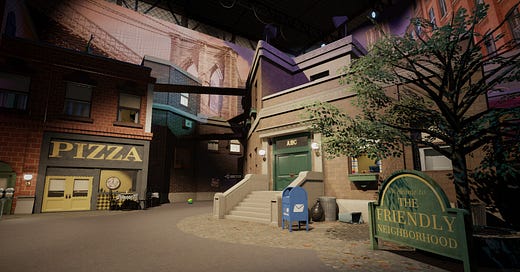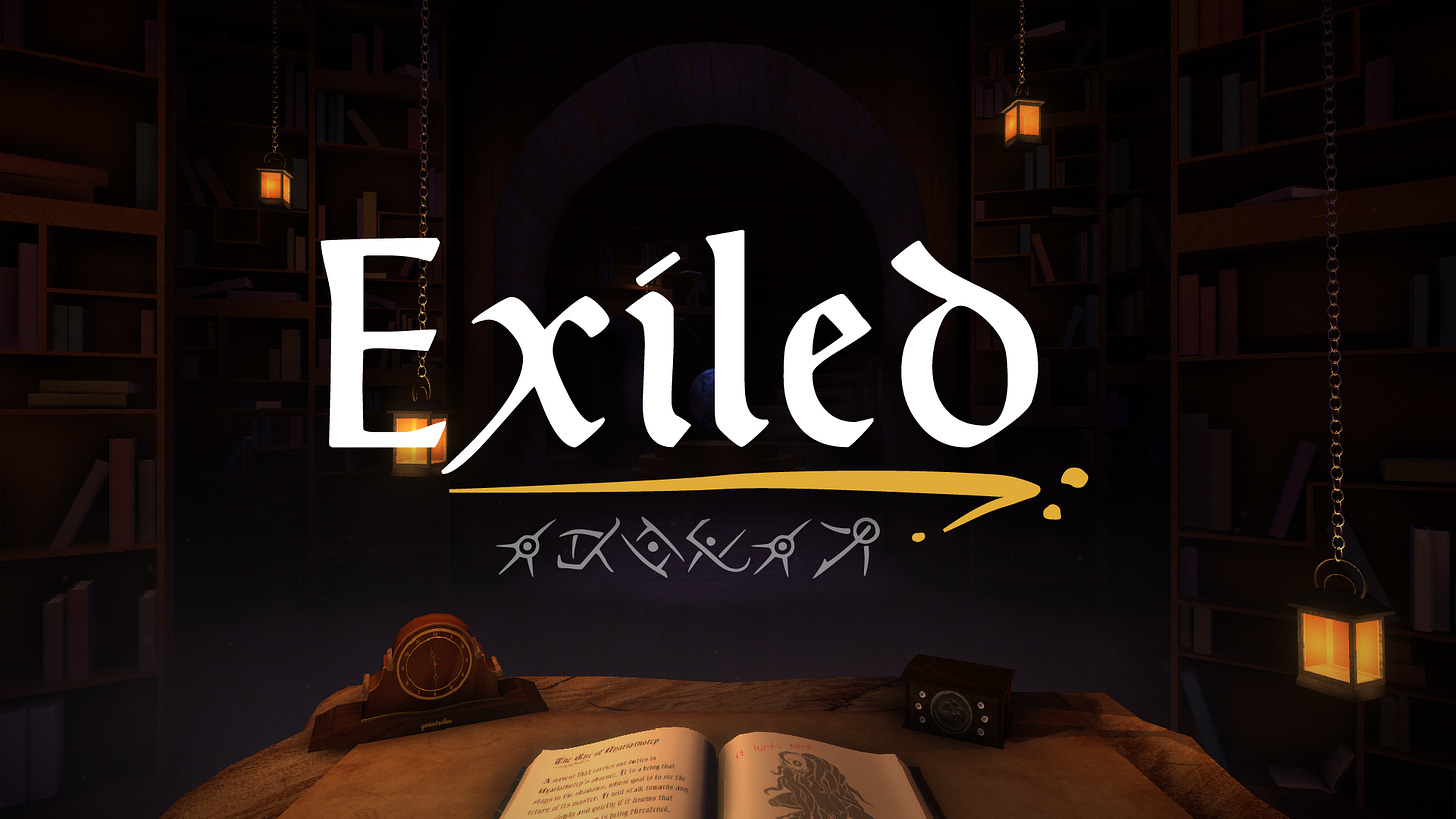Re-Enchantment through Video Games: Faith, Christian Media, and Gnosticism with Game Developer Evan Szymanski
[Still from My Friendly Neighborhood]
One of the most influential forces in our culture today is the video games industry, with its value reportedly having surpassed the film industry. Nevertheless, cultural commentators, particularly Christians, largely neglect discussing it. Today at Shadowlands Dispatch, Editor-in-Chief Megan Rials welcomes her friend Evan Szymanski, the scriptwriter and lead environment designer of the critically acclaimed 2023 game My Friendly Neighborhood, which was nominated for several awards at the Horror Game Awards and named one of the National Public Radio’s best games of the year. He and his brother John Szymanski have recently released Exiled (available for purchase on Windows, Mac, and Android), a short puzzle game where players must enter a mysterious library to decode an ancient language and rescue the narrator’s wife from Lovecraftian eldritch beings. In the following interview, Evan discusses the role of video games in Christian theology, his approach as a Christian developer, and how games contribute to the re-enchantment project.
Megan Rials: You’ve studied literary and film criticism. In light of that background, you and I have discussed at length the relationship between art, culture, and Christianity, especially in the context of your career as a video game developer. For readers unfamiliar with the game industry and the cultural import of games, describe your background as a developer and tell us how your faith informs your approach.
Evan Szymanski: While Johnny and David, my brothers, have been working as professional independent game developers for several years, I’ve spent the years after college dabbling in writing and filmmaking. I was working as a corporate graphic designer when Johnny offered me a spot on My Friendly Neighborhood, a horror-comedy game about rogue puppets on the set of an old children’s TV show. Having been praying for a change, I really wanted to do it but eventually decided, “I’ll stick with my grown-up job.” And then, around that week, my employer told me that I was going to be laid off the day before MFN started. That seemed like a clear sign that God wanted me here, at least for now.
On that project, I had the privilege of writing the script for the entire game, which turned out to be an exploration of some themes about faith and pain that have been important in my own life. Based on the response, it seems that those themes have resonated with our players, and I hope it has been helpful to them as they sort out how to work their way through the world.
[Still from My Friendly Neighborhood]
MR: How do you see your role as a Christian working in a media industry?
ES: I think a big problem with most “media by Christians” is that they come to the table with a preconceived idea of what they want to communicate and never allow themselves to question or challenge that framework. The goal is “bludgeon people into faith,” and they never really explore outside the boundaries, take other perspectives seriously, or deal with any difficult issues. My goal when writing is just to honestly engage with what I honestly feel is interesting or meaningful. As someone who wrestled with Christ, both intellectually and personally, for many years, that often means the themes I’m drawn to are about faith and philosophy. But I think the important thing is just to be honest; to express what God has placed in your heart, whether it has any obvious spiritual significance or not.
MR: You and your brother John Szymanski just recently released a short game called Exiled. What can you tell us about that game?
ES: I think Johnny’s done a great job of engaging with the Lovecraftian mythos in this game while giving it his own unique spin. Lovecraft once wrote that “all my tales are based on the fundamental premise that common human laws and interests and emotions have no validity or significance in the vast cosmos-at-large.” It’s a harsh outlook on the world, and you can feel that in his stories: there’s a cold, nervous angst always percolating under the surface. But Exiled exudes a much warmer ethos. It has actual jokes. And, not to spoil anything, but by the end there seems to be a possibility of real, objective hope and goodness prevailing against the conniving eldritch beings. So that’s an interesting wrinkle to the Lovecraftian style which players might find enriching for how they relate to our own sometimes-intimidating cosmos.
[Still from Exiled]
MR: Video games often get a bad rap, especially theologically. There are concerns that our current tech-saturated world fosters a disembodied experience, which might be viewed as a return of the ancient heresy of Gnosticism that denied the importance of the human body as part of God’s good creation to be resurrected in the new heavens and the new earth. How would you respond to that concern? Can Christians use video games in a way that doesn’t promote a disembodied experience, and if so, how?
ES: I wonder if the people who are concerned about this are looking at extreme phenomena, like Second Life, and assuming that those are representative of the whole. In actuality, if one were to sit down and play most popular games, you’d discover that some of their greatest pleasures are the same as reading or watching a film: the opportunity to have one’s mind transported in another world, to follow a gripping story, to learn about interesting characters, to experience beauty and meaning and structure. Would you say that reading encourages Gnosticism? C.S. Lewis and J. R. R. Tolkien didn’t think so — far from draining the real world of allure, they thought that reading about enchanted forests reminds us that all forests are a little enchanted.
There is a difference, of course, in that the player is encouraged to identify with an in-game avatar and control that avatar as though it’s an extension of one’s body. But I don’t think this relationship necessarily means that your perception of the real world will be denigrated. The game is giving you a chance to act in a drama, a little mystery play, and it’s probably up to the quality of the game designer’s art whether this will send you back with a heightened appreciation of your role in real life or not.
Here’s one down-to-earth example of how this might happen. Games can be physically and intellectually demanding, in terms of hand-eye coordination and reflexes, requiring practice and multiple attempts to succeed. Given the focus and skill required, the player might get into that “present in the moment” flow state, where you become hyper-aware of every sound you’re hearing, of every movement in your field of view, of the exact tilt of the joystick. Especially coupled with the satisfaction of overcoming a tough challenge, you might leave feeling refreshed and more appreciative of your physical body, not less.
MR: As a Christian game developer, what is your advice for Christians seeking to engage properly with video games?
ES: The unique characteristic of videogames is that they’re interactive, and this radically changes how the audience experiences and relates to the text. The player can dictate, somewhat, how the events of the game unfold. The game can respond and give feedback to the player’s actions, governed by the game’s rules. Choice, with its deepest moral connotations, suddenly becomes a meaningful aesthetic concept. By interactively playing roles woven from the various dramas and laws of a game world, we get a little glimpse on what our roles in the real world of God’s laws might mean.
I often hear older people ask, “How can we engage with the younger generation?” While not a comprehensive solution, I think videogames are an important part of that. Fortnite probably holds more cultural sway over the younger generation than every movie released last year put together. Now, it might not be that way forever, but videogames are not a phenomenon that’s going to go away, and they’re only going to increase in significance as the population who grew up playing videogames ages into older brackets. Anyone interested in engaging with our culture needs to engage with videogames.
If any of your readers are interested in exploring videogames more, what I’d recommend is for them to acquire and play The Legend of Zelda: Breath of the Wild. It’s super accessible, a consummate modern classic, and a great primer on what videogames are all about. If I may toot my own horn, you also might think about picking up My Friendly Neighborhood or Exiled, as both are also quite accessible, and Johnny and I would super appreciate it, as it would help support our future development.
Many thanks to Evan for taking the time to talk to us! If you’re interested in more of his work, you can check out his X page and his brother John Szymanski’s X page.






